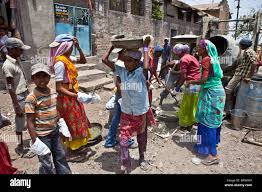Despite existing laws prohibiting child labor in Nigeria, children in Lagos continue to engage in hazardous activities on construction sites and dangerous streets to survive. Many of these children, some as young as 10 years old, are forced into such work due to dire financial circumstances, with families relying on their earnings for basic necessities like food and education.
A recent study conducted in Ibeju-Lekki Local Government Area, a hub of construction activity, revealed alarming statistics about the prevalence of child labor in the sector. The research identified 278 housing construction sites in the area, with children actively participating in tasks such as fetching water (32%) and carrying concrete (26%). Financial hardship was cited as the primary driver, accounting for 61% of cases, while some children (17%) were motivated by the desire to acquire skills. Tragically, these children face numerous risks, including malaria (54.7%) and construction-related accidents (5.9%).
On the streets of Lagos, the situation is equally grim. Children can be seen hawking goods in traffic or scavenging for recyclable materials in hazardous conditions. These activities expose them to dangers such as road accidents, exploitation, and health issues. Despite government efforts to curb child labor through policies and enforcement measures, economic realities often push families to disregard these regulations.
The Lagos State government has made strides in addressing child welfare through initiatives like the ongoing construction of the New Massey Street Children’s Hospital, which aims to improve pediatric healthcare access. However, analysts argue that more targeted interventions are needed to tackle the root causes of child labor. These include poverty alleviation programs, access to free education, and stricter enforcement of child protection laws.
Civil society organizations have also called for increased public awareness about the dangers of child labor and the importance of education. They emphasize that while children’s contributions may provide temporary relief for struggling families, the long-term consequences such as poor health, lack of education, and limited future opportunities are far more damaging.
As Lagos continues its push toward becoming a megacity with ambitious infrastructure projects, stakeholders urge the government to ensure that development does not come at the expense of vulnerable children. Addressing this issue requires a multi-faceted approach that combines economic support for families with robust enforcement of labor laws and investments in child welfare programs.





